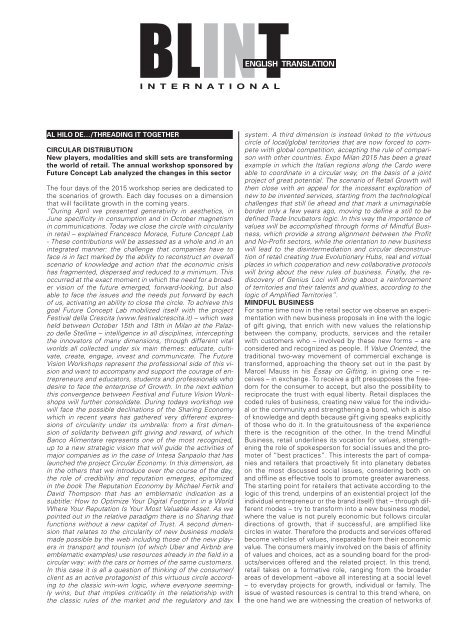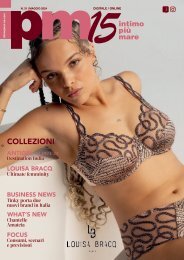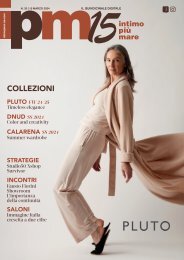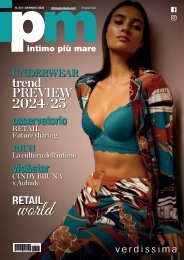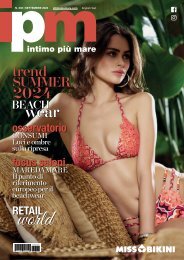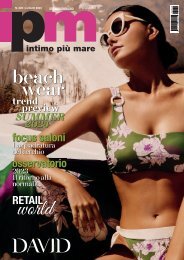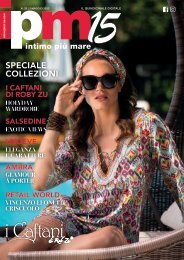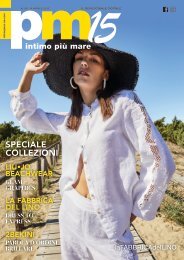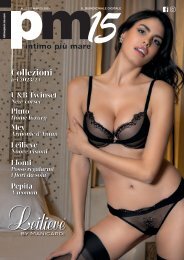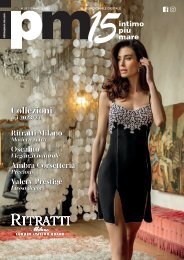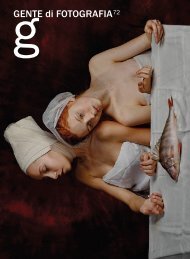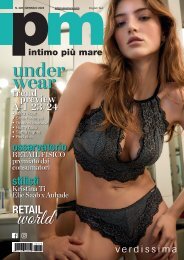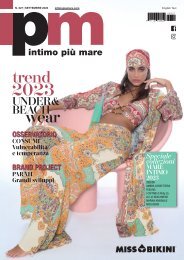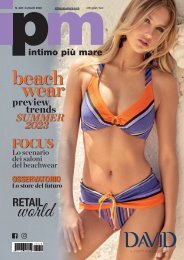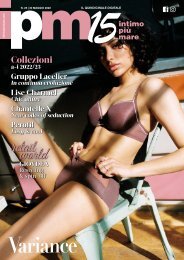Blint n° 75 - Enero 2016
Revista líder en España / Tendencias innovadoras del sector para boutiques, responsables de compras de comercios mayoristas, detallistas y profesionales.
Revista líder en España / Tendencias innovadoras del sector para boutiques, responsables de compras de comercios mayoristas, detallistas y profesionales.
Create successful ePaper yourself
Turn your PDF publications into a flip-book with our unique Google optimized e-Paper software.
BLINT<br />
ENGLISH TRANSLATION<br />
INTERNATIONAL<br />
AL HILO DE…/THREADING IT TOGETHER<br />
CIRCULAR DISTRIBUTION<br />
New players, modalities and skill sets are transforming<br />
the world of retail. The annual workshop sponsored by<br />
Future Concept Lab analyzed the changes in this sector<br />
The four days of the 2015 workshop series are dedicated to<br />
the scenarios of growth. Each day focuses on a dimension<br />
that will facilitate growth in the coming years.<br />
“During April we presented generativity in aesthetics, in<br />
June specificity in consumption and in October magnetism<br />
in communications. Today we close the circle with circularity<br />
in retail – explained Francesco Morace, Future Concept Lab<br />
- These contributions will be assessed as a whole and in an<br />
integrated manner: the challenge that companies have to<br />
face is in fact marked by the ability to reconstruct an overall<br />
scenario of knowledge and action that the economic crisis<br />
has fragmented, dispersed and reduced to a minimum. This<br />
occurred at the exact moment in which the need for a broader<br />
vision of the future emerged, forward-looking, but also<br />
able to face the issues and the needs put forward by each<br />
of us, activating an ability to close the circle. To achieve this<br />
goal Future Concept Lab mobilized itself with the project<br />
Festival della Crescita (www.festivalcrescita.it) – which was<br />
held between October 15th and 18th in Milan at the Palazzo<br />
delle Stelline – intelligence in all disciplines, intercepting<br />
the innovators of many dimensions, through different vital<br />
worlds all collected under six main themes: educate, cultivate,<br />
create, engage, invest and communicate. The Future<br />
Vision Workshops represent the professional side of this vision<br />
and want to accompany and support the courage of entrepreneurs<br />
and educators, students and professionals who<br />
desire to face the enterprise of Growth. In the next edition<br />
this convergence between Festival and Future Vision Workshops<br />
will further consolidate. During todays workshop we<br />
will face the possible declinations of the Sharing Economy<br />
which in recent years has gathered very different expressions<br />
of circularity under its umbrella: from a first dimension<br />
of solidarity between gift giving and reward, of which<br />
Banco Alimentare represents one of the most recognized,<br />
up to a new strategic vision that will guide the activities of<br />
major companies as in the case of Intesa Sanpaolo that has<br />
launched the project Circular Economy. In this dimension, as<br />
in the others that we introduce over the course of the day,<br />
the role of credibility and reputation emerges, epitomized<br />
in the book The Reputation Economy by Michael Fertik and<br />
David Thompson that has an emblematic indication as a<br />
subtitle: How to Optimize Your Digital Footprint in a World<br />
Where Your Reputation Is Your Most Valuable Asset. As we<br />
pointed out in the relative paradigm there is no Sharing that<br />
functions without a new capital of Trust. A second dimension<br />
that relates to the circularity of new business models<br />
made possible by the web including those of the new players<br />
in transport and tourism (of which Uber and Airbnb are<br />
emblematic examples) use resources already in the field in a<br />
circular way: with the cars or homes of the same customers.<br />
In this case it is all a question of thinking of the consumer/<br />
client as an active protagonist of this virtuous circle according<br />
to the classic win-win logic, where everyone seemingly<br />
wins, but that implies criticality in the relationship with<br />
the classic rules of the market and the regulatory and tax<br />
system. A third dimension is instead linked to the virtuous<br />
circle of local/global territories that are now forced to compete<br />
with global competition, accepting the rule of comparison<br />
with other countries. Expo Milan 2015 has been a great<br />
example in which the Italian regions along the Cardo were<br />
able to coordinate in a circular way, on the basis of a joint<br />
project of great potential. The scenario of Retail Growth will<br />
then close with an appeal for the incessant exploration of<br />
new to be invented services, starting from the technological<br />
challenges that still lie ahead and that mark a unimaginable<br />
border only a few years ago, moving to define a still to be<br />
defined Trade Incubators logic. In this way the importance of<br />
values will be accomplished through forms of Mindful Business,<br />
which provide a strong alignment between the Profit<br />
and No-Profit sectors, while the orientation to new business<br />
will lead to the disintermediation and circular deconstruction<br />
of retail creating true Evolutionary Hubs, real and virtual<br />
places in which cooperation and new collaborative protocols<br />
will bring about the new rules of business. Finally, the rediscovery<br />
of Genius Loci will bring about a reinforcement<br />
of territories and their talents and qualities, according to the<br />
logic of Amplified Territories”.<br />
MINDFUL BUSINESS<br />
For some time now in the retail sector we observe an experimentation<br />
with new business proposals in line with the logic<br />
of gift giving, that enrich with new values the relationship<br />
between the company, products, services and the retailer<br />
with customers who – involved by these new forms – are<br />
considered and recognized as people. If Value Oriented, the<br />
traditional two-way movement of commercial exchange is<br />
transformed, approaching the theory set out in the past by<br />
Marcel Mauss in his Essay on Gifting, in giving one – receives<br />
– in exchange. To receive a gift presupposes the freedom<br />
for the consumer to accept, but also the possibility to<br />
reciprocate the trust with equal liberty. Retail displaces the<br />
coded rules of business, creating new value for the individual<br />
or the community and strengthening a bond, which is also<br />
of knowledge and depth because gift giving speaks explicitly<br />
of those who do it. In the gratuitousness of the experience<br />
there is the recognition of the other. In the trend Mindful<br />
Business, retail underlines its vocation for values, strengthening<br />
the role of spokesperson for social issues and the promoter<br />
of “best practices”. This interests the part of companies<br />
and retailers that proactively fit into planetary debates<br />
on the most discussed social issues, considering both on<br />
and offline as effective tools to promote greater awareness.<br />
The starting point for retailers that activate according to the<br />
logic of this trend, underpins of an existential project (of the<br />
individual entrepreneur or the brand itself) that – through different<br />
modes – try to transform into a new business model,<br />
where the value is not purely economic but follows circular<br />
directions of growth, that if successful, are amplified like<br />
circles in water. Therefore the products and services offered<br />
become vehicles of values, inseparable from their economic<br />
value. The consumers mainly involved on the basis of affinity<br />
of values and choices, act as a sounding board for the products/services<br />
offered and the related project. In this trend,<br />
retail takes on a formative role, ranging from the broader<br />
areas of development –above all interesting at a social level<br />
– to everyday projects for growth, individual or family. The<br />
issue of wasted resources is central to this trend where, on<br />
the one hand we are witnessing the creation of networks of


